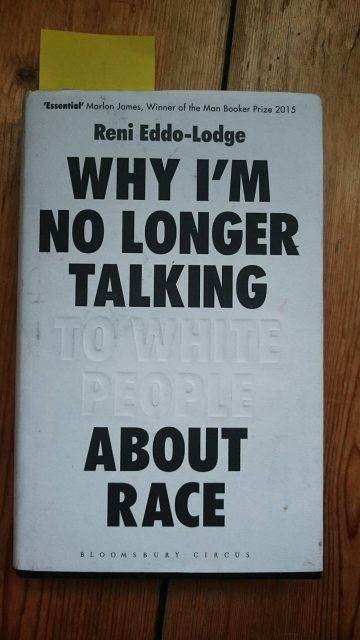This was a challenging book to read and a difficult subject to write about, but it is a book that everyone should read and a book that everyone should talk about. That's kind of the point of the book.
This book seeks to equip white British people with knowledge about the history of being black in Britain, including Britain's often forgotten involvement in the slave trade, and then shows how this has lead to a modern society that is structurally racist. The concept of white privilege is explained and the reader is shown how white privilege does apply to them, not just white people in the USA. The book finishes by explaining what to do about it, how to challenge it and how to slowly begin to change the world.
As a white person, living in the UK, this was an incredibly uncomfortable, but thought provoking read. Time and again I was called on to examine my own conscience and review my own prejudices before trying to arrive at a whole new way of thinking. It left me feeling embarrassed by my own ignorance and lack of empathy, but also fired up. This is an important book.
The book is concise, accessible and incredibly well explained. Eddo-Lodge explains why she needed to write the book - the flat out denial she would run into from white people when she began to talk about racism in the UK and I found that on reflection, what she was talking about was indeed my own reaction. As soon as I realised this I knew I needed to read on. I am exactly the kind of person this book was written for, and the chances are that you are too.
The first thing that really resonated with me were her thoughts on British black history:
While the black British story is starved of oxygen, the US struggle against racism is globalised into the struggle against racism that we should look to for inspiration - eclipsing the black British story so much that we convince ourselves that Britain has never had a problem with race.
I first read about, and attempted to understand, white privilege in the novel Small Great Things, by Jodi Piccoult (http://thisreadingmummy.blogspot.com/2017/03/book-review-small-great-things-by-jodi.html ) and was guilty of exactly that sentiment! Piccoult does a great job of explaining white privilege, but I was blinded to it in the way described by Eddo-Lodge, thinking that racism and white privilege is only relevant in the USA.
Structural racism is another concept that is difficult to understand (and difficult to swallow for many white British people) but is explained in a razor-sharp way by Eddo-Lodge:
Structural racism is dozens, or hundreds, or thousands of people with the same biases joining together to make up one organisation, and acting accordingly. Structural racism is an impenetrably white workplace culture set by those people, where anyone who falls outside of the culture must conform or face failure. Structural is often the only way to capture what goes unnoticed - the silently raised eyebrows, the implicit biases, snap judgements made on perceptions of competency.
Eddo-Lodge challenges the oft-cited defence of well-meaning white people that they are not racist, they don't even see race and they are raising their children to be colour blind.
Not seeing race does little to deconstruct racist structures or materially improve the conditions which people of colour are subject to daily. In order to dismantle unjust, racist structures, we must see race. We must see who benefits from their race, who is disproportionately impacted by negative stereotypes about their race, and to who power and privilege is bestowed upon - earned or not - because of their race, their class and their gender. Seeing race is essential to changing the system.
Eddo-Lodge challenges without aggression, and causes the reader to reflect on their own ingrained biases on just about every page. There were many times when I had to pause, re-read and take stock. Please read this book.
As a post script, other works of fiction that were brought to mind when reading this book and which may provide other perspectives and background information on some of the issues include Small Great Things by Jodi Piccoult (as already mentioned); Americanah by Chimamanda Ngozi Adichie ,which talks about the experience of being black in the USA; and Homegoing by Yaa Gyasi (http://thisreadingmummy.blogspot.com/2017/01/book-review-homegoing-by-yaa-gyasi.html) which attempts to explain the long lasting and far reaching consequences of slavery. However, all 3 of those books are about the American experience. I struggled to think of any books dealing with racism, the legacy of slavery or white privilege set in modern Britain, with British characters (which kind of proves Eddo-Lodge's point about Brits thinking race is an American issue). Small Island, by Andrea Levy came to mind though as it describes the shocking racism faced by Caribbean Immigrants to London in the 1940s/50s and the struggles they faced trying to settle in a new and often hostile country.
As always, suggestions of other relevant reading (fiction or non-fiction) are always very welcome.

No comments:
Post a Comment